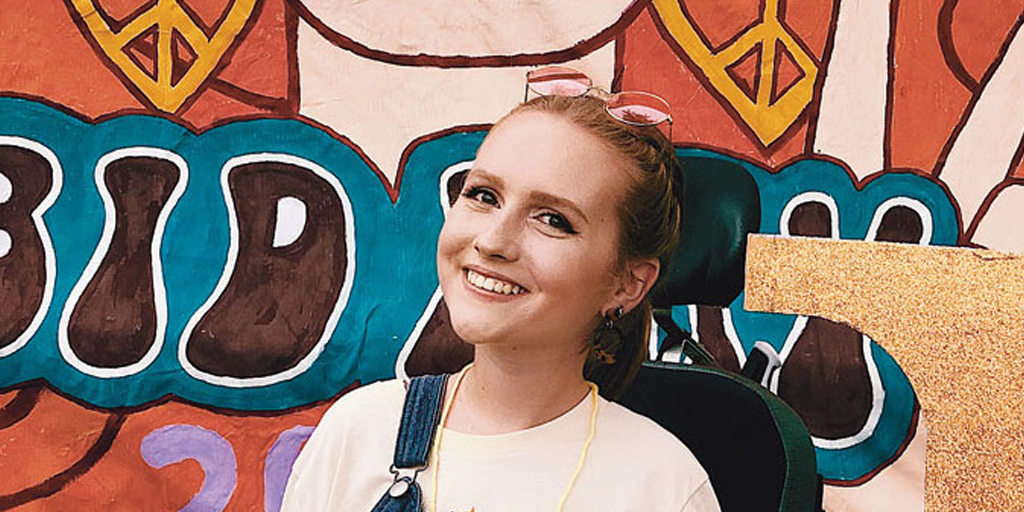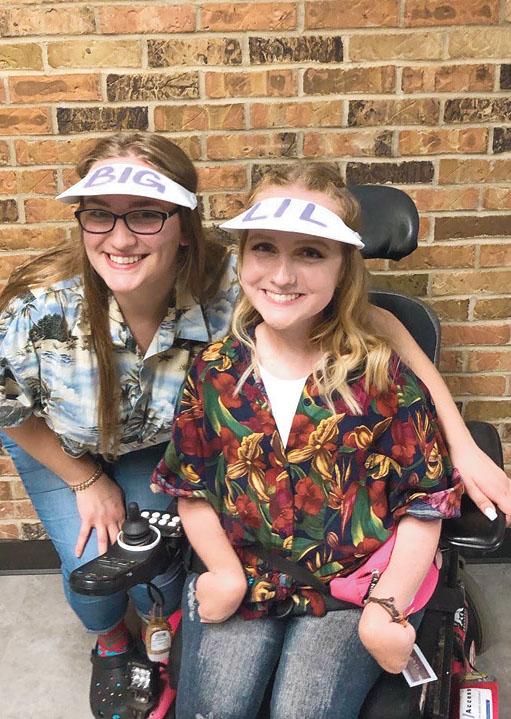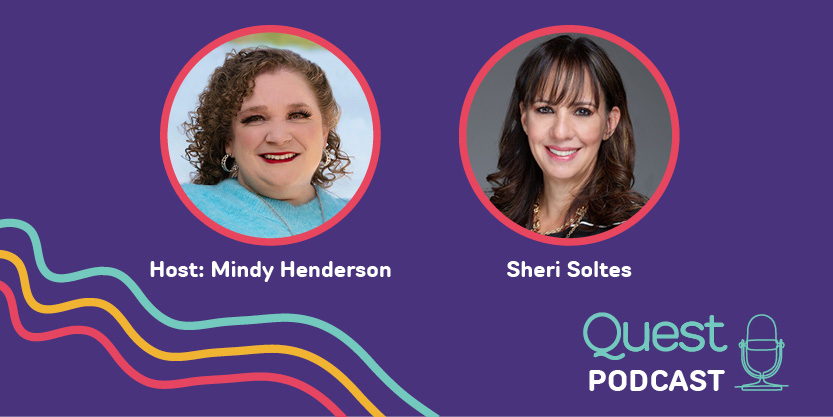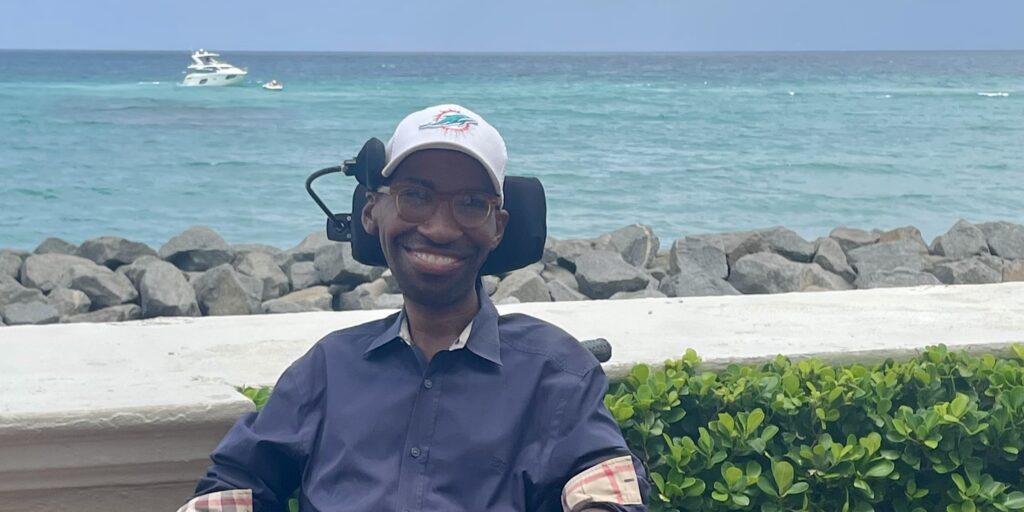
Smashing Stereotypes
By Jessica Hetzel | Friday, August 14, 2020
5 Second Summary
Read more personal stories from members of the neuromuscular community about their College Experience as they share their journey, accomplishments, advice for accommodations and overcoming barriers, and insights into navigating college life with a disability.
We all know sororities have a stereotype: skinny girls with blonde hair and blue eyes. I have never seen a disabled sorority girl.
Despite that stereotype, I knew I wanted to be a part of Greek life when I started my freshman year at Central Michigan University (CMU) in fall 2019. I signed up for formal recruitment as soon as registration opened.
Sorority recruitment is scary enough for an able-bodied woman, but as a woman with spinal muscular atrophy (SMA) who uses a power wheelchair, it was 10 times scarier. Throughout the process, I had worries in the back of my mind: Would the chapters discriminate against me? Would the girls ignore or pity me? Were the sorority houses accessible? If I couldn’t get into the house, would they not want me?
Finding a home
In September 2019, I was thrilled to find my home at the Phi Mu-Rho Delta chapter. On bid day, it was fun meeting my sisters, but I couldn’t get into our sorority house or take pictures on our porch. On that day, I felt excluded because of the staircase I watched my sisters walk up and down.
About a month later, CMU’s Office of Civil Rights and Institutional Equity (OCRIE) requested to meet with me regarding an investigation into discrimination. They said that during recruitment, two girls in a chapter decided to eliminate me because of my disability, and other members had reported it. My worst fear had come true. I had a knot in the pit of my stomach for months and wondered: Did I do something wrong? How could someone see me as unworthy because I’m disabled? Why would someone think less of me for something I can’t change? That feeling of discrimination is so deep and painful.
OCRIE gave me three options: take legal action, further the investigation, or handle it on my own. I decided to handle it by holding an educational meeting with the girls who did the discriminatory act. That meeting is still in the works, but other aspects of Greek life made me realize that they weren’t the only ones who would benefit from education on disability and inclusion.
Greek life
As much as I loved Phi Mu, I still felt excluded many times. When my sisters planned events, they did their best to make them accessible, but there were often hiccups. For example, we held an overnight retreat at an accessible venue, but there were only bunk beds, and it is extremely difficult for me to get on a bunk bed.

Educating her sisters on disability helped Jessica feel more connected to her sorority.
My sisters would attend events hosted at other Greek houses that were inaccessible. I would be in group chats watching my sisters plan a sleepover, and I knew I couldn’t attend because it was at an inaccessible apartment, and I use medical equipment at night.
The more I saw my sisters attending parties and events that I couldn’t go to, the sadder I got. I considered dropping out of the sorority. What was the point of being in a sorority if I had to constantly say no to activities?
Eye-opener
My life changed when I took “History of Disabilities in America.” This class talked about experiences I’ve had my whole life and showed me that I wasn’t alone. My professor, JoDell Heroux, PhD, inspired me so much that I decided to be the change I wanted to see in Greek life. I was not going to let one more woman be discriminated against during recruitment. I was not going to let one more woman feel unworthy because she was disabled.
In January, I hosted a chapter development meeting for Phi Mu focused on disability, inclusion, and service animals. I asked Dr. Heroux to present with me, and our one-hour-and-15-minute inclusion training seminar touched on service animal dos and don’ts, stereotypes of disabilities, different models of disabilities, ableism around us, inspiration porn, and the importance of inclusive language. We also led an activity on ableism to help our audience practice active learning and increase their information retention.
That day was a turning point. Since the meeting, our sisterhood has been stronger and richer. For the first time, I truly feel connected and included in my sorority. I feel almost as if my sisters can finally see the real me. And I hope they’ll use their knowledge to educate other people.
Bright future
Becoming a part of Greek life has been a long journey, and it’s only my first year. Even though I have faced challenges and difficulties, I wouldn’t trade any of my experiences because then I wouldn’t be able to help others. The feeling of educating people is so empowering, and I will continue to do it my whole life.
I plan to present the training seminar to all of the sororities and fraternities on campus. My goal is to make sure every sorority and fraternity house is accessible by the time I graduate. I want to make CMU’s Greek life the most accessible and inclusive in the country, because everyone deserves to find their home.
Discrimination stems from lack of knowledge, fear, and stereotypes. Once you remove those, you’d be surprised how accepting people are. Recently, CMU’s Greek life community gave me the New Member of the Year award. I am very proud, and I’m excited for what my future holds.
Grow through what you go through, and always be kind.
Jessica Hetzel, 18, lives in Michigan with her service dog, Emerson. She is a college student, disability advocate, and public speaker. Follow her journey on Instagram @jessshetzel and on her blog Just Roll With Me.
TAGS: College, College Experience, Education, From Where I Sit, Relationships, Young Adults
TYPE: Featured Article
Disclaimer: No content on this site should ever be used as a substitute for direct medical advice from your doctor or other qualified clinician.




